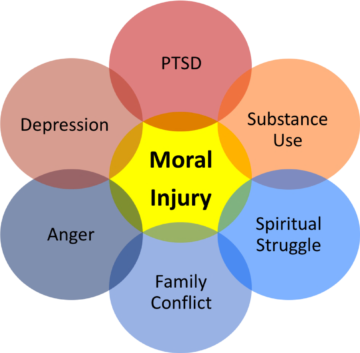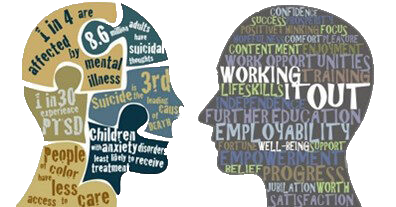Moral Injury and Suicide

Moral Injury is a phrase I had never heard of until I read a post by Tony Salvatore (LinkedIn) and to be honest, didn’t really understand it. However, over the last couple of weeks have read up on it and have a better understanding of what it encompasses.
“Moral injury is the damage done to one’s conscience or moral compass when that person perpetrates, witnesses, or fails to prevent acts that transgress one’s own moral beliefs, values, or ethical codes of conduct” https://moralinjuryproject.syr.edu/about-moral-injury/
Moral injury is more commonly associated with military experiences and PTSD, though perhaps there is a case to suggest it is applicable to many with suicidal behaviour.
Moral injury can lead to serious distress, depression, and suicidality. Moral injury can take the life of those suffering from it, both metaphorically and literally. Moral injury debilitates people, preventing them from living full and healthy lives.
The effects of moral injury go beyond the individual and can destroy one’s capacity to trust others, impinging on the family system and the larger community. Moral injury must be brought forward into the community for a shared process of healing.
In the context of a soul, with respect to the diversity of beliefs and religious perspectives held by those involved with moral injury, consider this:
Moral injury is damage done to the soul of the individual.
This post is not about the rights or wrongs of faiths/beliefs, so let’s not go down that route.
From my own experience, I can relate to the concept of moral injury. One of the issues I had to face in the early weeks and months after a suicide attempt was how to reconcile my belief in the sanctity of life and my suicide attempt.
There was a time, when Christian denominations did not take the most charitable approach to death by suicide and funerals. Burials in consecrated grounds were prohibited, permission from a Bishop had to be sought for a Requiem Mass to be said and I believe even now, a clergyman has the right to refuse to officiate at a funeral service if he/she so wishes.
Suicide in the Catholic Church was regarded a mortal sin, one that virtually condemned the individual to hell and damnation. Thankfully this is no longer the case, and the Church has softened its stance as recently as the 1980s/90s and recognises in the Catechism: Biological, Psychological and Physiological factors that contribute to suicide. (The mental health / suicide continuum).
Within the last decade, the Church of England has also reviewed and amended Canon Law in a
similar fashion.
Going back to my experience, the first priest I tried to talk to about my attempt was wholly dismissive and uninterested – that was even before the Confessional! That created a deep mistrust of the clergy and challenged my faith. The opportunity to make spiritual peace with myself was put on hold until I found someone willing to listen without judgement – and that did happen eventually.
For some spiritual healing is equally important as physical and mental healing and it’s relevance is not to be underestimated.
Moral injury can feed suicidal ideation, but conversely suicidal ideation may be fed by moral injury.
